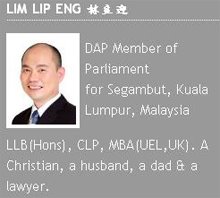Monday June 16, 2008
Stories by YIP YOKE TENG
The Coalition to Save Kuala Lumpur may eventually challenge the legality of the draft Kuala Lumpur City Plan 2020 in court as more residents associations and NGOs are convinced that it is fundamentally flawed.
Objection against the draft plan 2020 grows more intense with more parties recognising that it has failed to conform to the policies of low density in the National Physical Plan, National Urbanisation Plan and Kuala Lumpur Structure Plan 2020.
However, the coalition will seek intervention from the Prime Minis-ter, the Cabinet and parliamentarians before heading to court.
 Concerned ones: Panel of speakers at the KL Green Lung seminar organised by Malaysian Nature Society, (from left) Malaysian Nature Society executive director Dr Loh Chi Leong, Sri Bukit Persekutuan representative Charles Tan, Bukit Kiara representative Dr Pola Singh, MNS vice-president Datuk Dr Hashim Abdul Wahab, Bukit Sungai Puteh representative Dr Anne Munro-Kua and Bukit Gasing Joint Action Committee member Gary Yeoh.
Concerned ones: Panel of speakers at the KL Green Lung seminar organised by Malaysian Nature Society, (from left) Malaysian Nature Society executive director Dr Loh Chi Leong, Sri Bukit Persekutuan representative Charles Tan, Bukit Kiara representative Dr Pola Singh, MNS vice-president Datuk Dr Hashim Abdul Wahab, Bukit Sungai Puteh representative Dr Anne Munro-Kua and Bukit Gasing Joint Action Committee member Gary Yeoh.The Malaysian Nature Society became the latest NGO to recognise the non-compliance in the aspects of low development intensity and green lung conservation.
The society, following the conclusion of the KL Green Lung seminar it organised on June 14 at Rimba Ilmu building in Universiti Malaya, is submitting a report to the Federal Territories Ministry and the Kuala Lumpur City Hall (DBKL) to show its stand.
The report would also point out the need to strengthen existing laws to prohibit the de-gazetting of forest reserves as past experiences showed that green lung encroachments started with the local authority doing that without public knowledge.
An e-forum would be formed to bring together people wanting to save green lungs and to save Kuala Lumpur from becoming an all-choked-up city, while expanding the network of the Coalition to Save Kuala Lumpur.
“The gazetted open spaces, recreational and sports facilities in KL in 2000 accounts for 6.52% of the total KL land use,” said the society’s vice-president, Datuk Dr Hashim Abdul Wahab, who is also the organising chairman.
“However, if we were to add in the unused green areas or ungazetted land, the figure would increase up to 36% – this will be most suitable towards reaching a world-class city status,” he added.
The seminar was attended by residents’ representatives and was received warmly.
It was learnt that the DBKL was invited to the seminar and had confirmed attendance but pulled out a day before.
Meanwhile, the coalition has prepared a letter to alert the Prime Minister and his Cabinet about the draft KL City Plan 2020’s violation of the policies in the three plans.
It was penned by the alliance’s head Tan Sri Abdul Aziz Abdul Rahman and supported by all 22 organisations under the coalition.
“If necessary, the coalition, through the MPs, would seek to move a motion in parliament or to order a commission of inquiry into the planning of Kuala Lumpur to see if there was abuse of power,” said the coalition’s legal adviser Derek Fernandez.
The attendees opposed the draft plan’s intention to increase the city’s population by 600,000 in 12 years, calling that “a self-imposed criteria”, as it would only worsen the already serious problems of traffic, flooding, pollution and cost escalation.
They felt that the direction was fundamentally flawed as the National Physical Plan and National Urbanisation Plan had spelled out that developments should be spread across the identified conurbations, which should cover Seremban, Putrajaya and parts of Selangor in the case of the KL conurbation, to reach the ideal density of 25 people per hectare.
“Although the density in KL has exceeded that, we want the average density for the whole conurbation to be 25 people per hectare.
“KL is fully saturated, its density has to be reduced, it should not absorb the 600,000 people as the government's intention is for them to be spread across the conurbation,” he said.
He added that the National Physical Planning Council had set a target of open space coverage of 2ha per 1,000 people for KL as compared with merely 0.36ha now.
The open space coverage per 1,000 people for major cities are London (4ha), Melbourne (2ha), New York (2ha) and Toronto (2ha).
Fernandez also emphasised that DBKL officials should not use “pre-approved development” to justify their leniency towards developers as Section 24 of the Federal Territory Planning Act 1982 clearly stated that all Development Orders expire in one year.
Attendees expressed their frustration resulting from DBKL’s manner in dealing with their objections towards hillside developments, citing “the push-around treatment, officials’ false statements, empty promises and utter arrogance”.
They reckoned that new paradigms should be adopted to deal with the authorities, hence the need to further inculcate awareness and encourage involvement through ICT, as well as to be green voters. It was also unanimously agreed that an elected local government would be the remedy for many of the problems.




No comments:
Post a Comment